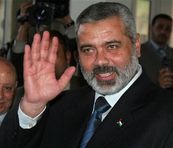New Hamas government to prepare emergency plan
The new Hamas government has prepared an emergency plan for its first three months of rule, and is to discuss it at its first Cabinet meeting Wednesday, the deputy Palestinian prime minister said. The new ministers need to find ways to make up for millions of dollars in foreign aid the international community is expected to withhold, largely because of Hamas' refusal to recognize Israel and renounce violence.

Since taking power last week, leaders of the Islamic militant group have increasingly softened their statements, but have stopped short of meeting the international community's demands. Sending such a mixed message, Palestinian Foreign Minister Mahmoud Zahar wrote to U.N. Secretary-General Kofi Annan on Tuesday that the new Hamas government believes its struggle against Israel 's military occupation is just, but that it wants to live side-by-side and in peace with its Israeli neighbors.
On Wednesday, the Hamas government was to hold its first Cabinet meeting since taking office two simultaneous sessions taking place in Gaza and the West Bank and hooked up by video conference. Israel doesn't permit Hamas ministers to travel between the two territories. The deputy prime minister, Nasser Eddin Shaer, said Hamas has prepared an emergency plan for the first three months of rule, but declined to give details.
Hamas' most immediate problem is to find enough money to pay 140,000 government employees, including teachers, health care workers and members of the security forces. The government salaries feed about one-third of the Palestinians, and in the past the money for the wages came in part from foreign aid and tax transfers Israel collected on behalf of the Palestinians. Israel has halted the transfers, and the U.S. and Canada have announced they are severing ties with the new government. The EU was to decide next week whether to cut aid to the Palestinian Authority.
Israel , meanwhile, has stepped up military strikes against Gaza in response to the firing of homemade rockets from the coastal strip on Israeli border communities. On Tuesday, Israeli war planes fired three missiles into a largely abandoned security compound near the Gaza City office of Palestinian President Mahmoud Abbas, and Israeli tanks fired shells into a residential area from which the army said rockets were fired. One Palestinian was killed and seven were wounded in the tank attack.
The Israeli military refused to comment about the purpose of the missile strike against the security installation, but Abbas, who was in the West Bank at the time, did not appear to be the target. Israeli security officials have said Israel wants to send clear messages to Hamas that it must halt attacks, and Israel pledged to intensify its military strikes after Gaza militants fired a Katyusha rocket at Israel last week for the first time. Abbas, who was elected separately a year ago, called for international intervention to stop what he called Israel 's "destruction for the sake of destruction." He said he contacted "the U.N., Russia , the EU and Arab states and told them that these actions complicate daily life and affect our human and social status."
In Israel , a new government was beginning to take shape after acting Prime Minister Ehud Olmert said Tuesday he considers the center-left Labor Party a senior partner in any future ruling coalition. An alliance of Labor and Olmert's centrist Kadima Party is seen as the most likely to push ahead with a unilateral withdrawal from much of the West Bank and Olmert's plan to draw Israel 's final borders by 2010. However, Olmert is also reaching out to the right-wing Israel Beitenu party, which advocates drawing Israel 's borders by excluding Israeli Arab communities and bringing in West Bank settlers. Olmert has said he would only sign up parties that support his West Bank plan.
Kadima legislator Roni Bar-On told Israel Radio that Israel Beitenu is being considered because Olmert wants to have as broad a coalition as possible to protect him against political blackmail and instability. Final results from last week's election gave Kadima 29 seats and Labor 19 in the 120-seat parliament, requiring them to bring in additional parties to secure a majority. Coalition talks are expected to take several weeks. Olmert was named acting premier on Jan. 4, when Prime Minister Ariel Sharon was felled by a stroke, reports the AP.
N.U.
Subscribe to Pravda.Ru Telegram channel, Facebook, RSS!




